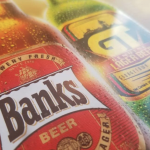
Local conglomerate Banks DIH Limited has recorded another year of improved earnings and profits.
In its annual report which has been dispatched to shareholders, Banks DIH has announced an improvement its shareholders’ value by recording a whopping 14.3% increase in after tax profits.
According to BANKS DIH Chief Executive Officer, Clifford Reis, the Group’s third party revenue was $32.9B compared to $30.5B in 2018, and this represented an increase of $2.3B or 7.7%.
Profit after tax attributable to shareholders was $4.8B compared to $4.2B in 2018; an increase of $611M or 14.3%.
On a micro scale, this means that there has been a growth in shareholder’s value.
Reis revealed that the Group’s Net Asset Value per share increased from $40.14 to $45.25, and that a dividend payment of $951M was made from the $4.8B Net Profit.
In relation to capital expenditure, it was highlighted that heavy investments were made in capital equipment over the past year.
Among these investments were the installation of increased storage capacity for potable water and equipment to accommodate increased production of ice cream products and new flavours of Frostee products.
Reis said the capital expenditure focus for 2020 will be primarily on capital equipment for the beer bottling plant which encompasses the procurement and installation of an uncaser, a case packer, conveyors, and a labeler.
Additionally, he shared that expenditure will go towards the purchase of trucks and lift trucks to further the selling and distribution activities, and investments in the construction of a new multi-level vehicle parking facility and ‘Banks Automotive & Services Inc.’ which will be located at Demerara Park.
Meanwhile, the revenue of Citizens Bank – a 51% owned subsidiary of Banks DIH – was $3.4B compared to $3.1B in 2018; an increase of $262M or 8.3%.
It was revealed that profit before tax was $1.5B compared to $1B in 2018; an increase of $590M or 58.5%. Similarly, the after tax profit increased by 58.6% – from $602M in 2018 to $955M this year.
These improved results were, according to the Chairman, derived principally from the increases in physical sales of core products sold both in the domestic and export markets.
But this was not achieved without challenges.
According to Reis, “for the greater part of the year just ended, we were challenged to adjust to the impact which rising fuel prices had on the company’s revenue stream.”
He said that this challenge, among others, necessitated prudent management of financial and human resources.
However, the Chairman shared an optimistic outlook for 2020 with the commencement of oil production in Guyana, noting that the company will continue to examine its core competencies to respond to new opportunities which may be made available.

















You must be logged in to post a comment Login